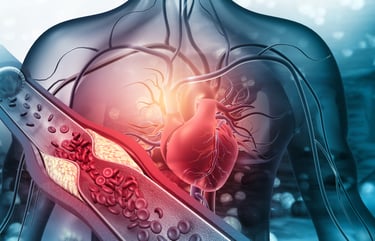eStoreRx™
Online Supplement Dispensary
eStoreRx™ is an easy direct-to-patient ordering & fulfilment program for lifelong wellness.
For over 40 years, Biotics Research Corporation has revolutionized the nutritional supplement industry by utilizing “The Best of Science and Nature”. Combining nature’s principles with scientific ingenuity, our products magnify the nutritional
eStoreRx™ is an easy direct-to-patient ordering & fulfilment program for lifelong wellness.
Biotics Research is proud to expand our commitment to education with the Wellness Unfiltered Pro Podcast. Each episode delves into key health topics and the clinical applications of our premier products. Through candid, insightful conversations, our team offers practical guidance to keep you informed and empowered as a healthcare professional.
February 26 2026
A study published recently in the Journal of Cachexia, Sarcopenia and Muscle raises concerns about a possible side-effect of long-term statin drug use...
 A recent study has concluded that the LDL cholesterol of a specific group of people given a carbohydrate-restricted diet (CRD) decreases when a moderate amount of carbohydrate is reintroduced into their diets.
A recent study has concluded that the LDL cholesterol of a specific group of people given a carbohydrate-restricted diet (CRD) decreases when a moderate amount of carbohydrate is reintroduced into their diets.
Studies have previously shown that carbohydrate-restricted diets hold promise for those interested in proper weight management, blood sugar regulation, as well as other health issues.
This new study aimed to uncover why people respond so differently to a CRD. Some individuals experience a reduction in LDL cholesterol, while others encounter extreme elevations. The researchers planned to elucidate possible sources of heterogeneity in LDL cholesterol response to a CRD and thereby identify individuals who may be at risk for LDL cholesterol elevation.
This study of 548 individuals found that body mass index (BMI) was inversely associated with LDL cholesterol change. That means that low BMI was consistently associated with LDL cholesterol increase on a CRD. On the other hand, low triglyceride (TG) to HDL cholesterol ratio, considered a marker of good metabolic health, predicted larger LDL cholesterol increases.
Interestingly, a subgroup of respondents with LDL cholesterol ≥200 mg/dL, HDL cholesterol ≥80 mg/dL, and TG ≤70 mg/dL were characterized as “lean mass hyper-responders (LMHR).” Respondents with that phenotype (n = 100) had a lower BMI and, remarkably, similar prior LDL cholesterol versus other respondents. In the case series, later moderate reintroduction of carbohydrates produced a marked decrease in LDL cholesterol.
The results of this study suggest that a large elevation in LDL cholesterol on a CRD is more likely to occur in people who are lean and metabolically healthy. Moreover, the research found evidence to support the existence of a lean mass hyper-responder (LMHR) phenotype, using an a prior definition, characterizing individuals with unremarkable baseline LDL cholesterol and marked LDL cholesterol elevation on a CRD. This phenotype contrasts with the usual pattern of atherogenic dyslipidemia observed in populations at high risk for atherosclerotic CVD, which presents as normal to high LDL cholesterol alongside high TG and low HDL cholesterol.
The significance of elevated LDL cholesterol in the context of good metabolic health markers warrants further research and consideration.
Submit this form and you'll receive our latest news and updates.
Two controlled trials evaluating supplemental myo-inositol have recently been published. The first, in the journal Diabe...
Learn more“Clinical guidelines have progressively lowered the recommended LDL-C target for high-risk CVD patients to below 70 mg/d...
Learn more
*These statements have not been evaluated by the Food and Drug Administration. This product has not intended to diagnose, treat, cure, or prevent any disease.
© 2025 Biotics Research Corporation - All Rights Reserved
Submit your comment